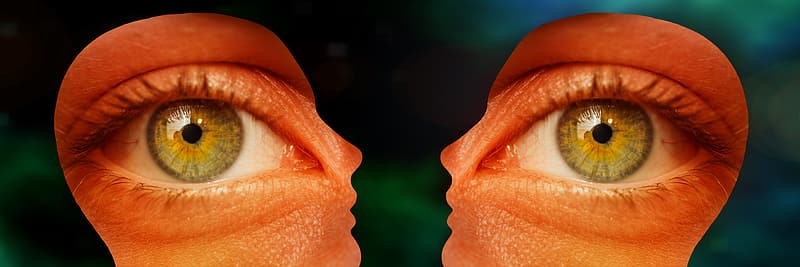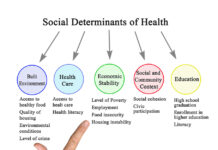In a new meta-analytic study, researchers examined the relevance of self-compassion in the development of eating disorders and body image issues. The researchers also investigated the effects of psychotherapies that use self-compassion to reduce symptoms of these forms of distress. Their findings suggest that self-compassion is significantly related to eating disorders and body image and that using psychotherapeutic interventions to increase self-compassion can reduce these symptoms. According to the authors, Fidan Turk and Glen Waller from the University of Sheffield:
“With self-compassion, instead of escaping from negative emotions or pushing them away, those emotions are acknowledged as valid and important. Therefore, self-compassionate people are less likely to engage in avoidance/escape or suppression of emotions . . . individuals who are less compassionate have difficulties generating and activating self-soothing emotions. These individuals are not able to regulate threat-based emotions, and therefore they overeat as a way of calming emotional states.”
 Symptoms associated with disordered eating, such as restriction and binging and purging, can have a negative impact on people’s psychological and physical wellbeing. The prevalence of these disorders varies cross-culturally, and some evidence suggests that Western cultures have higher levels of eating disorders. Yet, cultural change and the westernizing trend of globalization might explain the recently increasing incidence of these symptoms in non-Western societies.
Symptoms associated with disordered eating, such as restriction and binging and purging, can have a negative impact on people’s psychological and physical wellbeing. The prevalence of these disorders varies cross-culturally, and some evidence suggests that Western cultures have higher levels of eating disorders. Yet, cultural change and the westernizing trend of globalization might explain the recently increasing incidence of these symptoms in non-Western societies.
Concerns with body image and negative self-image have been identified as the main predictor of eating disorders. The experience of childhood bullying has been identified as a factor negatively impacting body image, self-esteem, and disordered eating. Among the long-lasting adverse effects of bullying that some people experience is the development of internal voices that are sometimes related to the presence of eating disorders and negative body image.
A variety of treatments have been found to be effective for treating eating disorders, including psychodynamic therapy, cognitive-behavioral therapies, supportive therapy, family therapy, and interpersonal therapy, among others. Recent studies on family therapy and cognitive-behavioral therapy have reported between 45-70% remission rates. However, some patients with eating disorders do not improve. For this reason, it has been suggested that research and practice pay further attention to the emotional aspects of these mental health concerns, as some have identified disordered eating as a way of coping with negative emotions.
Binge-purge episodes have been identified as a coping strategy, as these behaviors provide short-term relief from negative emotions. In response, self-compassion is an adaptive way of regulating these emotions. Self-compassion has been theorized as a way of non-judgmentally understanding our pain and that suffering is a part of our human condition. From this point of view, self-compassion is divided into three components: self-kindness, common humanity, and mindfulness, as opposed to self-judgment, isolation, and over-identification.
Previous research has found that therapeutic interventions that involved mindfulness and self-compassion were effective in treating depression and that short self-compassion courses helped increase college student’s quality of life. Self-compassion may prevent eating disorders by strengthening resilience factors and mitigating risk factors. Yet, it has been challenging to make clear conclusions about the effectiveness of self-compassion, as there is variability in research methodologies and the target symptoms of treatment.
The latest study aimed to investigate the relationships between self-compassion and levels of eating and body image concerns and determine whether interventions focusing on developing self-compassion were effective in relieving these concerns.
The researchers identified 67 studies that met criteria for their study, and 59 provided enough information for analysis. The sample size varied between 9 to 1306 participants, and the majority of the participants were women. The studies were mostly based on samples from Western countries.
The results of the analysis suggest that greater self-compassion was significantly related to having lower levels of eating pathology and that self-compassion interventions had a significant and substantial effect in reducing symptoms of eating disorders.
The researchers also found that higher self-compassion was associated with greater positive body image and that higher levels of body concerns were related to lower levels of self-compassion.
Finally, when analyzing research on treatments, they concluded that those who were exposed to self-compassion interventions in therapy had more symptomatic improvement than those who did not experience these interventions.
The main limitations of the study were the selection bias, as most studied used in the meta-analysis failed to use representative samples. This limits the generalizability of the findings. Because most studies were correlational, they could also not make any claims about a cause-and-effect relationship between self-compassion and the symptoms associated with eating disorders. The authors explain:
“The findings might be an under-representation of non-Western cultures, potentially resulting in limited generalizability or inflation of the findings due to positive findings being more likely to be published in English language journals… [And] many of the self-compassion interventions were part of a wider therapy, meaning that the apparent effect size might have been affected. ‘Pure’ self-compassion studies need to be compared with other treatment approaches.”
The results of this study have clear implications for research and practice. The authors suggest studying how and why self-compassion influences symptoms of eating disorders.
For clinical practice, the results of this study suggest that self-compassion-based interventions may be effective in the prevention and treatment of eating disorders. The researchers hypothesize that restrictive and binge-purge behaviors are often a way of avoiding or suppressing negative emotions. Psychotherapy that incorporates self-compassion interventions may provide an adaptive alternative for coping with negative emotions.
****
Turk, F., & Waller, G. (2020). Is self-compassion relevant to the pathology and treatment of eating and body image concerns? A systematic review and meta-analysis. Clinical Psychology Review, 101856. (Link)















Thanks Jose.
Good job.
The further we move away from pathologizing, the closer we will get.
Report comment
“Concerns with body image and negative self-image have been identified as the main predictor of eating disorders. The experience of childhood bullying has been identified as a factor negatively impacting body image, self-esteem, and disordered eating. Among the long-lasting adverse effects of bullying that some people experience is the development of internal voices that are sometimes related to the presence of eating disorders and negative body image.”
Perhaps the real expert is ALWAYS the client. And as such I will repost a comment from a poster who passed on. I hope she would not mind:
Julie Greene, MFA November 1, 2018 at 10:41 pm
As usual, the most important factor was left out. Were these individuals in treatment for their EDs? This is so important. I believe the ED voice is treatment-induced. I have seen the believe in the ED-Devil-like character induced in treatment, coerced into patients by therapy. This is caused by exposure to ED-specific therapy. Those who have not had this type of therapy do not have an ED voice and have never heard of such a thing. All you have to do, if you want to induce an ED voice, is to pester a patient, repeatedly, “What is ED saying?” Just ask that a bunch of times, obnoxiously, expecting a response. Ask like ED is a real person that has taken possession of the vulnerable, trapped patient. Now, the patient is more trapped. By the imaginary Devil ED. Very good job. You have succeeded! Now you have a guaranteed Revolving Door Syndrome.
Report comment
Wow, that seems titanically dumb! Give your “eating disorder” it’s own personality and power and indepencence, as if it were a separate entity. How the heck is THAT supposed to help? So you can tell your “ED” voice to go f*&k itself? Seems utterly idiotic! Has anyone ever seen this idea be helpful in any way?
Report comment
Few of their ideas ever apply.
Report comment
I had the same exercise when I was in therapy for OCD.
“What is your OCD telling you to do?” “Your OCD is lying to you.” “Your OCD is trying to trick you.” “Your OCD is always going to be there for the rest of your life, waiting until you slip up and do your compulsions.”
Is it any wonder that I got better when I WASN’T in therapy?
After finding MIA I was able to see what my “disorders” are just thoughts. No better or no worse than other thoughts. It allowed me to dismiss the more obsessive ones because suddenly they weren’t important anymore. They weren’t a part of myself that I needed to be at war with or an evil entity lurking in my brain. They were just random thoughts that can be ignored.
My fear was only important because I viewed it as the “other” and the “disease” versus identifying it as an emotion. Now I know that they’re just emotions and will come and go.
Report comment
That’s been my experience, both as a helper and as a “helpee.” These “disorders” are just a way of experiencing the world, and we have to be the ones to decide what is and isn’t the best way to approach it. Most of the time, people have adapted to difficult circumstances by developing a way of thinking about the world or interacting with the world that seemed to work at the time. So accepting that these thoughts/behaviors/emotions have served a purpose, and then asking oneself what purpose they continue to serve, has been a successful path for me. Others would frame that differently. But in any case, what is helpful is NORMALIZING the experience as part of your own process, rather than externalizing it and making it seem like “OCD” or “ED” is some external agent that is attacking you! It reminds me a lot of demon possession. Not saying some people might not find it helpful, but it sure seems counterproductive to me.
Report comment
As someone who recovered from 30 years of anorexia/bulimia AND has a dissociative disorder in which I do hear voices (internal parts that never integrated because of trauma); I can say that I find this idea of referring to my eating disorder as another person, horrifying.
My eating disorder was not an external voice, it was a coping mechanism to deal with severe trauma. It gave me something to focus on and at times prevented me from being trafficked because I was too ill.
I think the idea of externalizing an eating disorder and calling it ‘ED’ was popularized by the book, “Life Without Ed” by Jenni Schaefer. Somehow an idea that was a metaphor in her personal therapy, has now become a treatment technique. Sadly, several of the treatment centers I was in promoted this concept as a legitimate form of therapy.
Report comment
Hear Hear.
It’s sad that many get trapped, but there is hope that if one lives long enough, to be able to realize that the “experts” have absolutely no clue. In fact, even one person’s lived journey can only ever be their own.
Psychiatry/psychology has to STOP borrowing from clients and turning that into therapy.
Few are blessed to be “therapists”. Many have the ability to walk beside.
Report comment